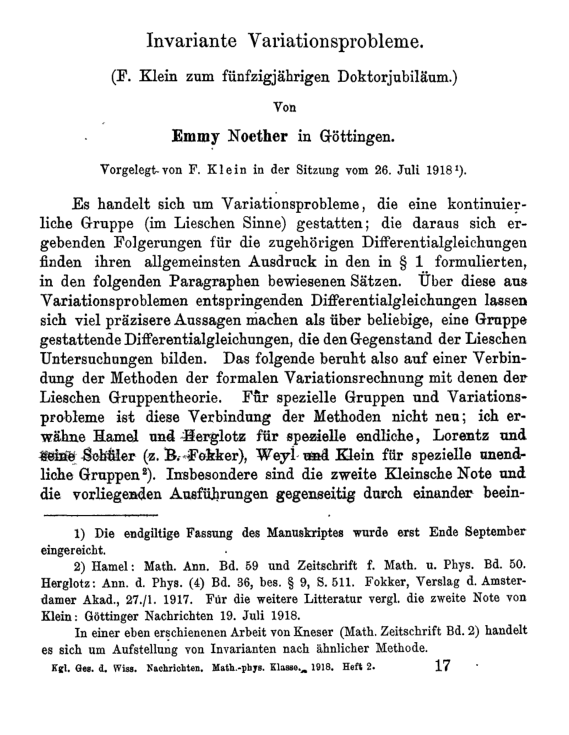Continuous Symmetry of the Action of a Physical System with force has a corresponding Conservation law
Symmetry indicates same physical principles against action (Noether Current’s derivative is 0)
- Symmetry against Space transition (Space translation invariance) → Conservation of momentum → Inertia
- Symmetry against time transition (Time translation invariance) → Conservation of Energy
- Symmetry against rotation (Rotational invariance) - Conservation of Angular Momentum
- Symmetry against Global phase invariance (U(1)) → Charge conservation
This shows that the Conservation law is not absolute and inevitable, but rather a conditional property that is not absolute in all situations and depends on symmetry. In other words, it means that if symmetry is broken, conservation laws may not apply. This can be seen simply when interpreting Redshift, where the time translation symmetry is broken, and the energy conservation law does not seem to hold due to changes in wavelength.
Einstein explained the consistency of physical laws in General Relativity, clarified by Noether's work. This gives symmetry to spacetime transformations by fixing physical laws, including the speed of light, despite the foreign nature of spacetime. The conserved quantity for this symmetry of spacetime transformation is the Stress-energy tensor, and it is conserved without change rate as . In other words, in redshift, while time symmetry is broken, it is interpreted that energy is redistributed in the expanded spacetime that flexibly changes with spacetime symmetry.
Because the theory of relativity explains gravity as the curvature of spacetime itself, it requires modeling the entire curved spacetime gravitational field as a Stress–energy–momentum pseudotensor for the expression of gravitational energy.
Symmetry of physical laws under variation of the path in time
Principle of stationary action → Euler–Lagrange equation
Conservation of Energy
For a static empty universe
However, our universe is not globally symmetric with respect to time since spacetime itself evolves. Global energy conservation does not hold, even though local conservation () still applies.
Contracted Bianchi identities
Noether's theorem
Noether's theorem states that every continuous symmetry of the action of a physical system with conservative forces has a corresponding conservation law. This is the first of two theorems published by mathematician Emmy Noether in 1918. The action of a physical system is the integral over time of a Lagrangian function, from which the system's behavior can be determined by the principle of least action. This theorem only applies to continuous and smooth symmetries of physical space.
https://en.wikipedia.org/wiki/Noether%27s_theorem

우주의 기본 원리 대칭성에 대하여(뇌터의 정리)_과학_34
우주의 기본 원리인 대칭성을 발견하고 정리한 뇌터의 정리. 아인슈타인은 그녀를 천재라고 칭송했죠.
이 영상은 주)카이스토리와 함께합니다.
#대칭성 #뇌터의 정리 #물리학
석군 후원하기!
계좌이체를 통한 후원 : 우리은행 1002-149-139184(석**)
아래 링크를 클릭하면 투네이션을 통해 손쉽게 후원이 가능하십니다.
https://toon.at/donate/seokuntv
채널 멤버쉽 가입하기!
https://www.youtube.com/channel/UCsOm...
여러분의 소중한 후원은 더 빠른 영상 업로드에 굉장히 많은 도움이 됩니다.
비지니스 문의 : fkdlxkaos@naver.com
https://www.youtube.com/watch?v=Em-cqknAFKw&t=52s

아인슈타인도 몰랐던 상대성이론의 구멍 (양자역학 영상을 보셨다면 이것도 보셔야 합니다!)
에너지 보존 법칙은 틀린 걸까요? 레전드, 그리고 또 레전드 영상. 세상을 바라보는 눈이 달라질 겁니다.
(고립계에선 항상 유효합니다)
처로님 멤버십 가입 감사합니다.
▀▀▀
A huge thank you to Prof. Geraint Lewis, Prof. Melissa Franklin, Prof. David Kaiser, Elba Alonso-Monsalve, Richard Behiel, Prof. Leo Stein and Jakob Schwintenberg for their invaluable expertise and contributions to this video.
Special thanks to Alessandro from ScienceClic for his help on animations and input on the script. Check out his excellent video on Noether’s theorem here: • The Symmetries of the universe
▀▀▀
0:00 대칭성이란 무엇인가?
4:25 에미 뇌터와 아인슈타인
7:33 일반 공변성
11:59 최소 작용의 원리
15:29 뇌터의 제1정리
18:24 연속 방정식
23:20 뇌터의 뒷이야기
24:49 표준 모형 - 힉스, 쿼크 등등
▀▀▀
References:
MathHistory Biography - Emmy Amalie Noether via mathshistory.st-andrews.ac.uk - https://ve42.co/BioNoether
Bartlett, J. G. (2021). The Standard Cosmological Model and CMB Anisotropies. New Astron.Rev. 43 (1999) 83-109 - https://ve42.co/CosmoCMB
Kimberling, C. (1982). Emmy Noether, Greatest Woman Mathematician. Mathematics Teacher, March 1982, Volume 84, Number 3, pp. 246–249. - https://ve42.co/NoetherGreat
Blunck, A., et al. (2016). Mathematik und Gender. Verlag Franzbecker - https://ve42.co/MathGender
Evans, R. J. (1976). The Feminist movement in Germany, 1894-1933. Sage Publications - https://ve42.co/FeministGer
Without Emmy Noether, there would be a huge gap in mathematics and its understanding via www.mpg.de - https://ve42.co/NoetherGap
Dihedral group of order 6 via Wikipedia - https://ve42.co/Dihedral6
Emmy Noether University of Erlangen via Wikipedia - https://ve42.co/Erlangen
Timeline of women in mathematics via Wikipedia - https://ve42.co/WomenMath
Elizaveta Litvinova via Wikipedia - https://ve42.co/LitvinovaE
Sofya Kovalevskaya via Wikipedia - https://ve42.co/KovalevskayaS
Charlotte Scott via Wikipedia - https://ve42.co/ScottC
Cornelia Fabri via Wikipedia - https://ve42.co/FabriC
Emmy Noether, the renowned mathematician who taught 20 years of unpaid classes just because she was a woman via english.elpais.com - https://ve42.co/NoetherPay
Noether, E. (1908). Über die Bildung des Formensystems der ternären biquadratischen Form. Reimer - https://ve42.co/NDissert
Noether, E. (1983). Invariante Variationsprobleme. Gott.Nachr.1918:235-257,1918; Transp.Theory Statist.Phys.1:186-207,1971 - https://ve42.co/InvarProb
Noether, E. (2018). M. A. Tavel’s English translation of “Invariante Variationsprobleme”. arXiv - https://ve42.co/InvarProbEn
Byers, N. (1998). E. Noether’s Discovery of the Deep Connection Between Symmetries and Conservation Laws*. Mod.Phys.Lett. A14 (1999) 99-104 - https://ve42.co/SymCon
De Haro, S. (2021). Noether’s Theorems and Energy in General Relativity. Cambridge University Press, 2021 - https://ve42.co/EnergyGR
Rowe, D. E. (2019). Emmy Noether on Energy Conservation in General Relativity. arXiv - https://ve42.co/EnergyCon
Branding, K. (2005). A Note on General Relativity, Energy Conservation, and Noether’s Theorems. Springer - https://ve42.co/GRanEC
Additional References:
https://ve42.co/NoethersAdRefs
▀▀▀
Special thanks to our Patreon supporters:
Adam Foreman, Albert Wenger, Alex Porter, Alexander Tamas, Anton Ragin, Autodidactic Studios, Balkrishna Heroor, Bertrand Serlet, Blake Byers, Bruce, Dave Kircher, David Johnston, David Tseng, Evgeny Skvortsov, Garrett Mueller, Gnare, gpoly, Greg Scopel, iRick, Jon Jamison, Juan Benet, Keith England, KeyWestr, Kyi, Lee Redden, Marinus Kuivenhoven, Matthias Wrobel, Meekay, meg noah, Michael Krugman, Orlando Bassotto, Paul Peijzel, Richard Sundvall, Sam Lutfi, TTST, Tj Steyn, Ubiquity Ventures, wolfee
▀▀▀
Directed by Matthew Davies
Written by Matthew Davies, Casper Mebius, Derek Muller and Pablo Rovetto
Edited by Trenton Oliver, Peter Nelson and Nick Lear
Animated by Fabio Albertelli, Emma Wright, Andrew Neet, Alessandro Roussel and Ivy Tello
Illustrations by Jakub Misiek, Cainejan Esperanza, Tommy Stevens, Maria Gusakovich and Emma Wright
Additional research by Henry van Dyck, Gabe Strong and Darius Garewal
Produced by Matthew Davies, Casper Mebius, Derek Muller, Zoe Heron, Rob Beasley Spence and Tori Brittain
Thumbnail contributions by Jakub Misiek, Ren Hurley, Ben Powell and Peter Sheppard
Additional video/photos supplied by Getty Images and Pond5
Music from Epidemic Sound
Translated by Mingi Kwon, CineLingo
Dubbed by Mingi Kwon
https://www.youtube.com/watch?v=yKDq4mGlVAU


 Seonglae Cho
Seonglae Cho